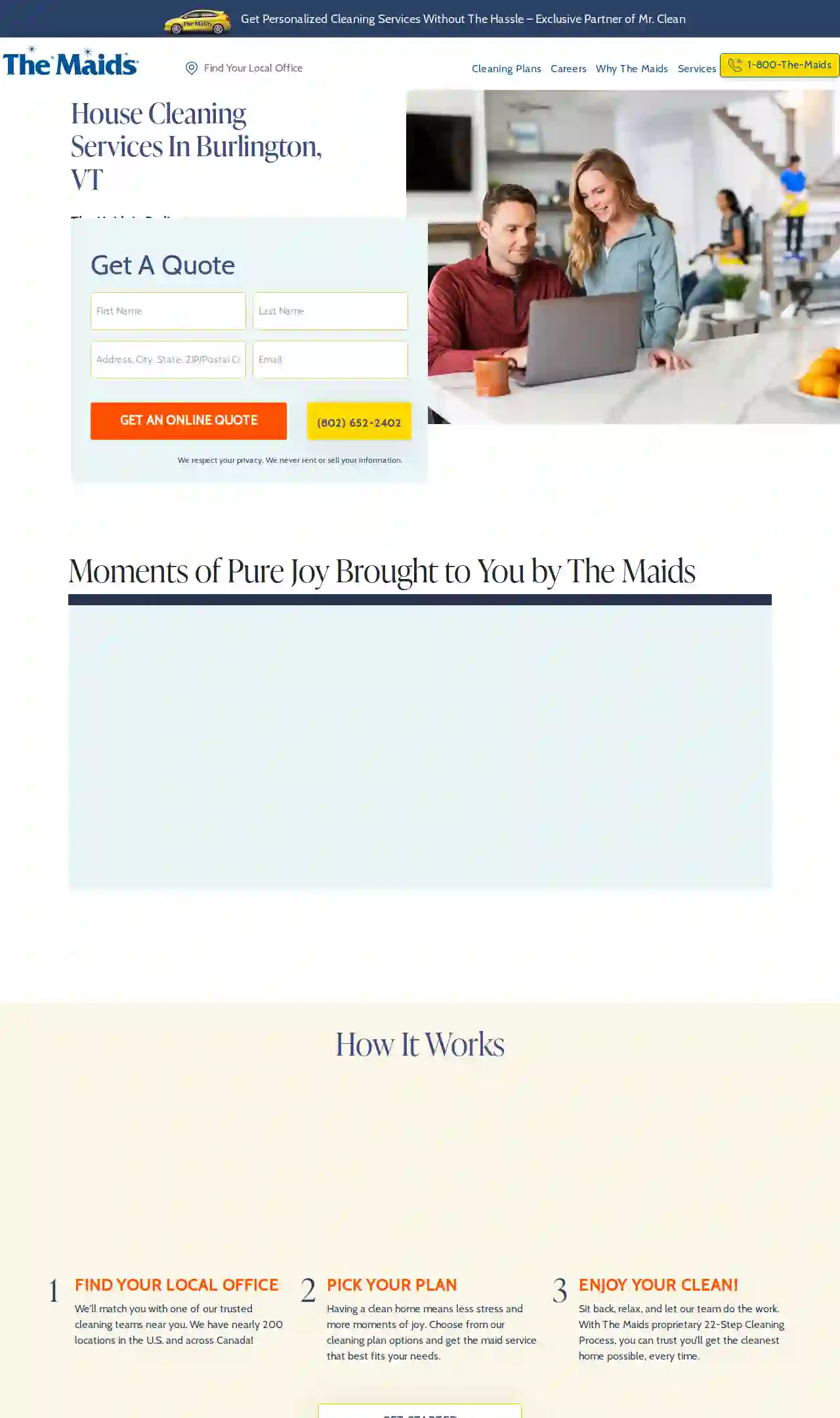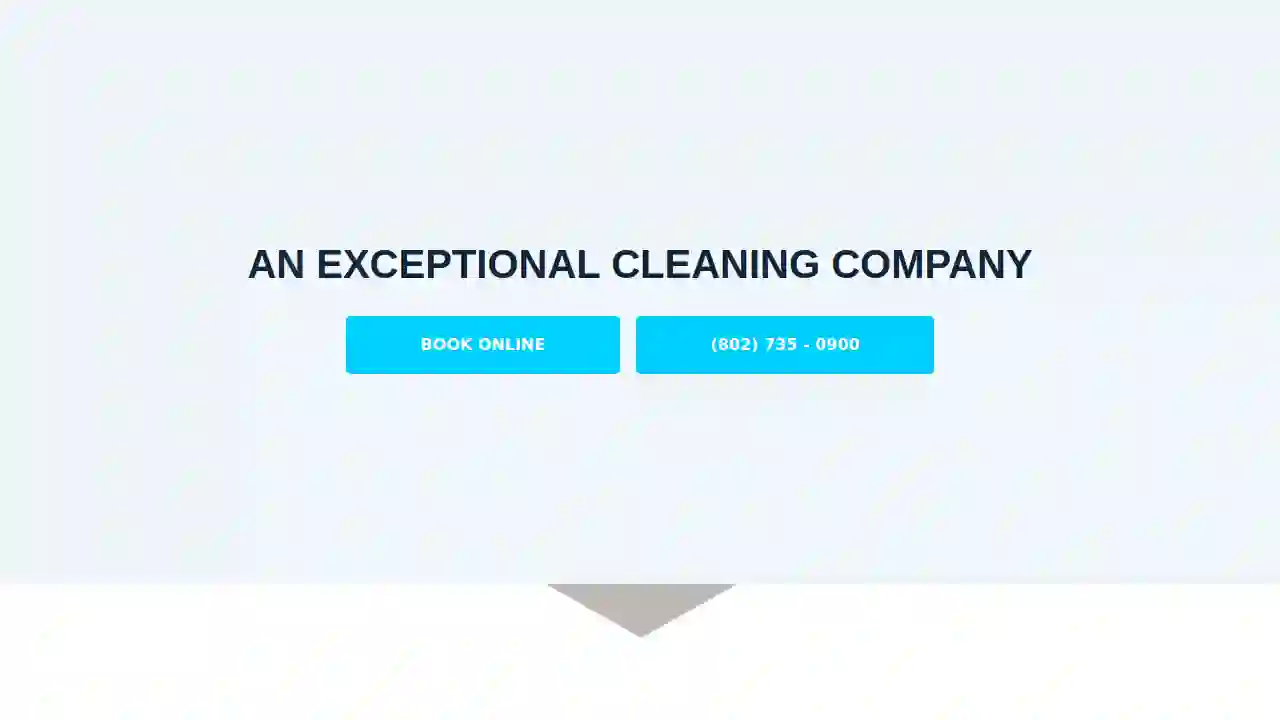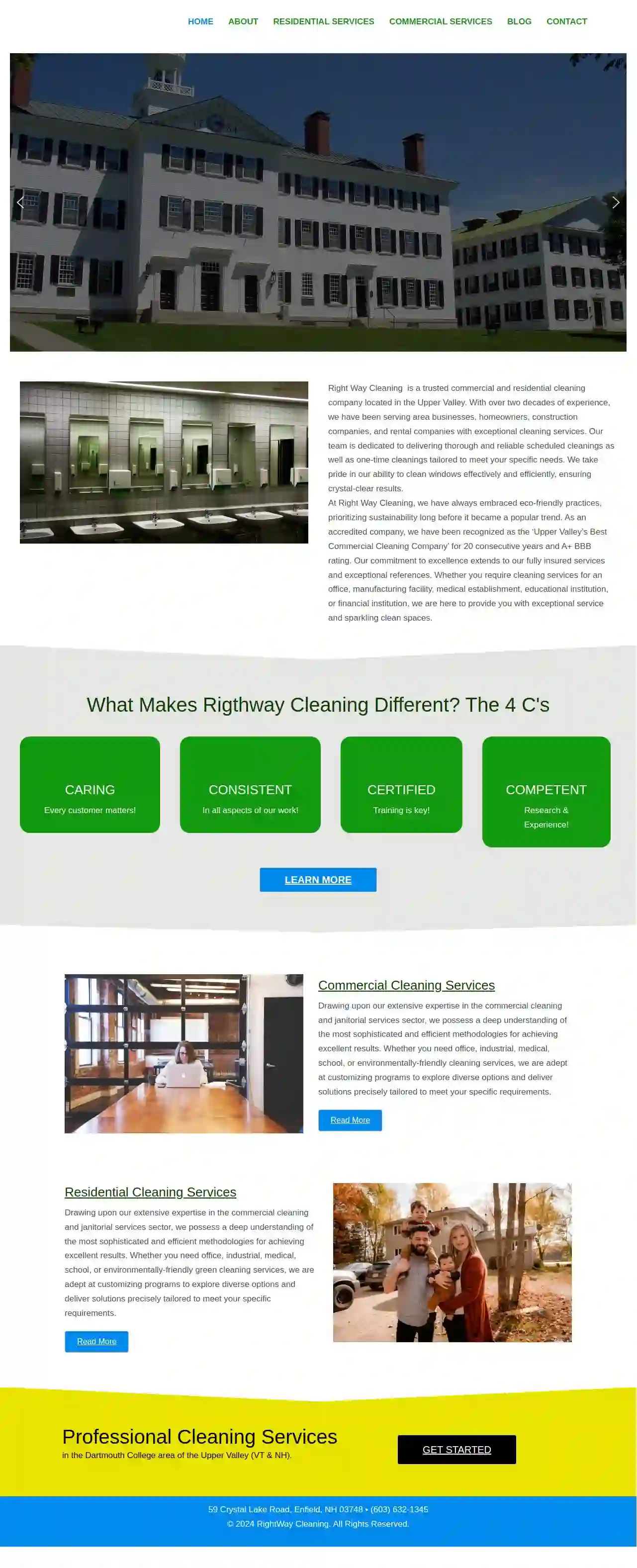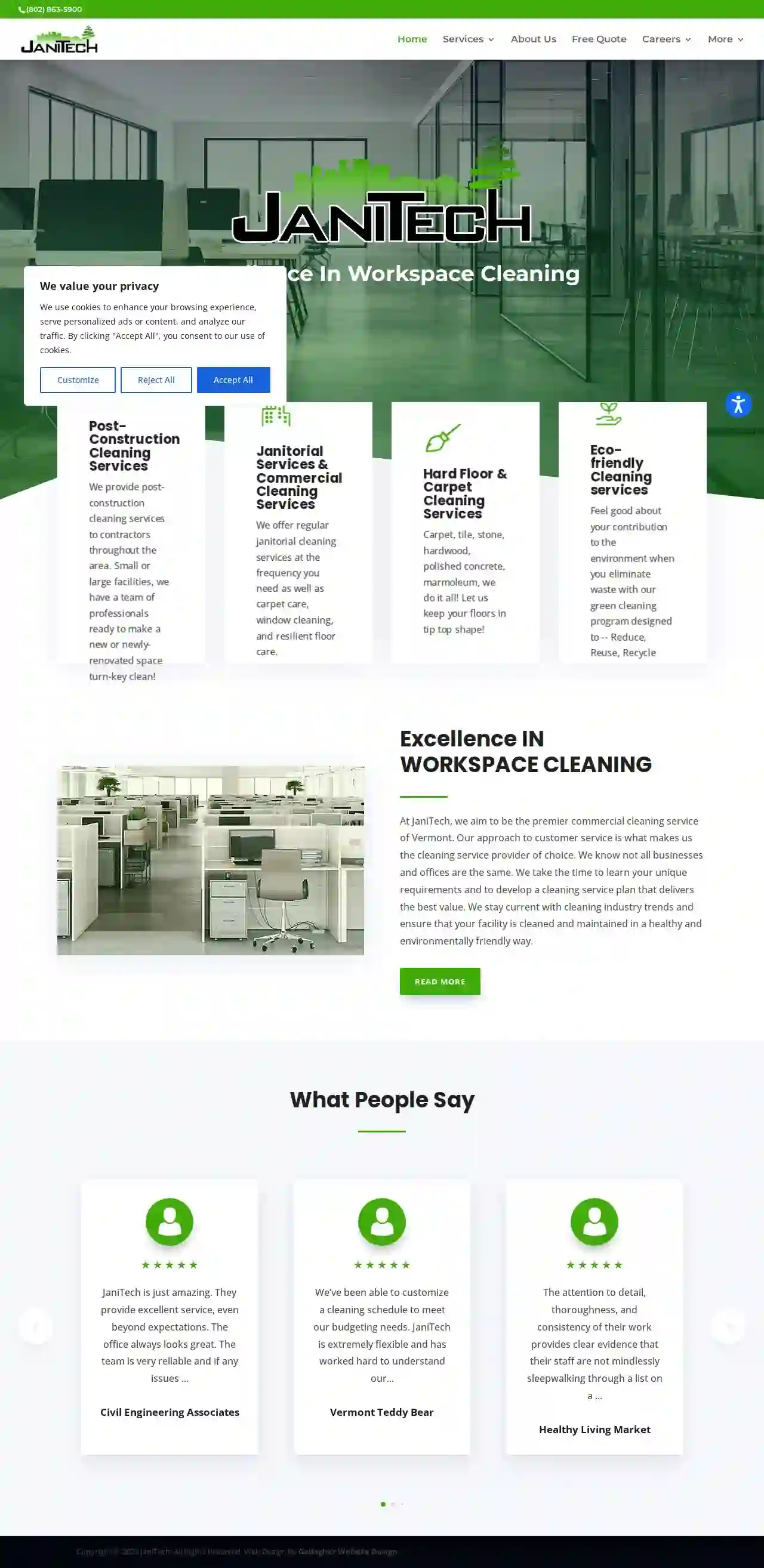Cleaning Services Brandon
Find top Home Cleaning in Brandon
Receive multiple Cleaning Services quotes for your project today! Compare profiles, reviews, accreditations, portfolio, etc... and choose the best service.
Service Needed
City or Town

Upper Valley Cleaning Solutions
57 reviewsBurlington, US- Services
- Why Us?
- Gallery
Get Quote
The Maids in Burlington
38 reviewsBurlington, US- Services
- Why Us?
Get Quote
Cleaners Unit
4.656 reviewsBurlington, US- Services
- Why Us?
Get Quote- CS
CSR Service LLC
57 reviewsBurlington, US- Services
- Why Us?
Get Quote 
Right Way Cleaning LLC
4.819 reviewsBurlington, US- Services
- Why Us?
Get Quote- Em
Empire Janitorial Supply Co
4.47 reviewsBurlington, US- Services
- Why Us?
Get Quote - Th
The Janitors
3.713 reviewsBurlington, US- Services
- Why Us?
Get Quote 
JaniTech
3.311 reviewsBurlington, US- Services
- Why Us?
Get Quote
JC Crew
510 reviewsBurlington, US- Services
- Why Us?
Get Quote- St
Steward’s Housekeeping and Property Management L.L.C.
513 reviewsBurlington, US- Services
- Why Us?
Get Quote
Over 60,241+ Janitorial Contractors on our platform
Our janitorial service providers operate in Brandon and surrounding areas!
CleaningMatch has curated and vetted the Best Janitorial Contractors in Brandon. Find a top & trustworthy business today.
Frequently Asked Questions About Cleaning Services
Find answers to common questions about cleaning services and hiring cleaning companies in the USA.
- Prepare the Windows: Remove dust and debris from windows using a brush, vacuum, or damp cloth.
- Cleaning Solution: Use a commercial glass cleaner or a homemade solution of equal parts water and vinegar.
- Spray and Wipe: Spray the cleaning solution onto the window, ensuring even coverage.
- Squeegee Technique: Use a squeegee to wipe the cleaner from top to bottom, overlapping each stroke by about an inch. Wipe the squeegee blade clean after each stroke.
- Dry Edges: Wipe the edges of the window with a clean, dry microfiber cloth to remove any remaining moisture.
- Experience and a proven track record: Choose companies with a solid history of providing quality cleaning services.
- Positive customer reviews and testimonials: Check online reviews and ratings to gauge customer satisfaction.
- Licensed and insured professionals: Ensure the company has the necessary licenses and insurance to protect you from liability.
- Clear and transparent pricing: Obtain detailed quotes and compare prices from multiple companies.
- Good communication and responsiveness: Choose a company that communicates clearly, responds promptly, and addresses your concerns.
- Experience: 'How long have you been in business, and what type of cleaning services do you specialize in?'
- Licensing and Insurance: 'Are you licensed, insured, and bonded? Can I see proof of coverage?'
- Background Checks: 'Do you conduct background checks on your employees?'
- Cleaning Supplies: 'Do you provide your own cleaning supplies and equipment, or should I provide them?'
- Cleaning Methods: 'What cleaning methods and products do you use?'
- References: 'Can you provide references from previous clients?'
- Scheduling and Availability: 'What days and times are you available for cleaning?'
- Pricing and Payment: 'What is your pricing structure, and what payment methods do you accept?'
- Cancellation Policy: 'What is your cancellation policy?'
- Satisfaction Guarantee: 'Do you offer a satisfaction guarantee? What happens if I'm not happy with the service?'
- Declutter first: Before cleaning, declutter surfaces and remove any items that don't belong. This makes cleaning easier and prevents distractions.
- Gather your supplies: Assemble all your cleaning supplies, including cleaners, cloths, sponges, and a trash bag, in a caddy or bucket to avoid wasting time searching for them.
- Work from top to bottom: Start cleaning from the top of each room and work your way down to prevent dust and debris from falling on already cleaned surfaces.
- Focus on high-traffic areas: Pay extra attention to high-traffic areas like kitchens and bathrooms, where dirt and germs accumulate quickly.
- Use the right tools: Utilize appropriate cleaning tools for different surfaces and tasks. Microfiber cloths are effective for dusting and cleaning glass, while scrub brushes are ideal for tough stains.
- Clean in sections: Break down larger tasks into smaller sections to avoid feeling overwhelmed. Focus on one area at a time before moving on to the next.
- Establish a routine: Create a regular cleaning schedule and stick to it. This prevents dirt buildup and makes cleaning more manageable.
What is the best way to clean windows without streaks?
Achieving streak-free windows requires the right technique and cleaning solutions. Follow these steps:
For best results, clean windows on a cloudy day or in the shade to prevent the cleaning solution from drying too quickly and leaving streaks.
For best results, clean windows on a cloudy day or in the shade to prevent the cleaning solution from drying too quickly and leaving streaks.
How do I find a good cleaning service?
Finding a reputable cleaning service requires research and due diligence. Look for companies with:
Utilize online directories like CleaningMatch to find and compare qualified cleaning services in your area.
Utilize online directories like CleaningMatch to find and compare qualified cleaning services in your area.
What should I ask a cleaning service before hiring them?
Before hiring a cleaning service, consider asking these questions to ensure they meet your requirements and expectations:
By asking these questions, you can assess their professionalism, reliability, and suitability for your cleaning needs.
By asking these questions, you can assess their professionalism, reliability, and suitability for your cleaning needs.
What are some tips for cleaning my own home efficiently?
Cleaning your home efficiently can save time and effort. Follow these tips to streamline your cleaning routine:
By implementing these strategies, you can clean your home more efficiently and maintain a cleaner and healthier living space.
By implementing these strategies, you can clean your home more efficiently and maintain a cleaner and healthier living space.
What is the best way to clean windows without streaks?
Achieving streak-free windows requires the right technique and cleaning solutions. Follow these steps:
For best results, clean windows on a cloudy day or in the shade to prevent the cleaning solution from drying too quickly and leaving streaks.
- Prepare the Windows: Remove dust and debris from windows using a brush, vacuum, or damp cloth.
- Cleaning Solution: Use a commercial glass cleaner or a homemade solution of equal parts water and vinegar.
- Spray and Wipe: Spray the cleaning solution onto the window, ensuring even coverage.
- Squeegee Technique: Use a squeegee to wipe the cleaner from top to bottom, overlapping each stroke by about an inch. Wipe the squeegee blade clean after each stroke.
- Dry Edges: Wipe the edges of the window with a clean, dry microfiber cloth to remove any remaining moisture.
For best results, clean windows on a cloudy day or in the shade to prevent the cleaning solution from drying too quickly and leaving streaks.
How do I find a good cleaning service?
Finding a reputable cleaning service requires research and due diligence. Look for companies with:
Utilize online directories like CleaningMatch to find and compare qualified cleaning services in your area.
- Experience and a proven track record: Choose companies with a solid history of providing quality cleaning services.
- Positive customer reviews and testimonials: Check online reviews and ratings to gauge customer satisfaction.
- Licensed and insured professionals: Ensure the company has the necessary licenses and insurance to protect you from liability.
- Clear and transparent pricing: Obtain detailed quotes and compare prices from multiple companies.
- Good communication and responsiveness: Choose a company that communicates clearly, responds promptly, and addresses your concerns.
Utilize online directories like CleaningMatch to find and compare qualified cleaning services in your area.
What should I ask a cleaning service before hiring them?
Before hiring a cleaning service, consider asking these questions to ensure they meet your requirements and expectations:
By asking these questions, you can assess their professionalism, reliability, and suitability for your cleaning needs.
- Experience: 'How long have you been in business, and what type of cleaning services do you specialize in?'
- Licensing and Insurance: 'Are you licensed, insured, and bonded? Can I see proof of coverage?'
- Background Checks: 'Do you conduct background checks on your employees?'
- Cleaning Supplies: 'Do you provide your own cleaning supplies and equipment, or should I provide them?'
- Cleaning Methods: 'What cleaning methods and products do you use?'
- References: 'Can you provide references from previous clients?'
- Scheduling and Availability: 'What days and times are you available for cleaning?'
- Pricing and Payment: 'What is your pricing structure, and what payment methods do you accept?'
- Cancellation Policy: 'What is your cancellation policy?'
- Satisfaction Guarantee: 'Do you offer a satisfaction guarantee? What happens if I'm not happy with the service?'
By asking these questions, you can assess their professionalism, reliability, and suitability for your cleaning needs.
What are some tips for cleaning my own home efficiently?
Cleaning your home efficiently can save time and effort. Follow these tips to streamline your cleaning routine:
By implementing these strategies, you can clean your home more efficiently and maintain a cleaner and healthier living space.
- Declutter first: Before cleaning, declutter surfaces and remove any items that don't belong. This makes cleaning easier and prevents distractions.
- Gather your supplies: Assemble all your cleaning supplies, including cleaners, cloths, sponges, and a trash bag, in a caddy or bucket to avoid wasting time searching for them.
- Work from top to bottom: Start cleaning from the top of each room and work your way down to prevent dust and debris from falling on already cleaned surfaces.
- Focus on high-traffic areas: Pay extra attention to high-traffic areas like kitchens and bathrooms, where dirt and germs accumulate quickly.
- Use the right tools: Utilize appropriate cleaning tools for different surfaces and tasks. Microfiber cloths are effective for dusting and cleaning glass, while scrub brushes are ideal for tough stains.
- Clean in sections: Break down larger tasks into smaller sections to avoid feeling overwhelmed. Focus on one area at a time before moving on to the next.
- Establish a routine: Create a regular cleaning schedule and stick to it. This prevents dirt buildup and makes cleaning more manageable.
By implementing these strategies, you can clean your home more efficiently and maintain a cleaner and healthier living space.